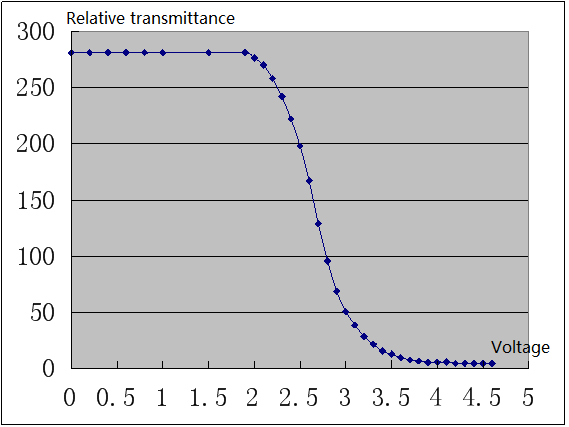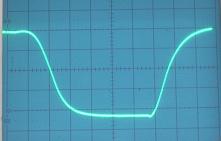
Transmittance vs. applied voltage

Observed response curve on oscilloscope
Features
Compact system
Low cost
Ample experimental content
Introduction
The LEOI-35 Experimental System for LC Electro-Optic Effect is designed to provide students with a practical understanding of the electro-optic effect in liquid crystals (LC), which is a crucial phenomenon for numerous modern technologies. Liquid crystals are a unique state of matter that exhibit properties between those of liquids and solid crystals, making them ideal for applications in electronics and optics.
The electro-optic effect of liquid crystals is the change in optical properties, such as transmittance and birefringence, when subjected to an external electric field. This phenomenon forms the basis for many LC-based devices such as displays, spatial light modulators, optical modulators, and optical switches. Understanding this effect is essential for students working with modern display technology and optical communications.
The LEOI-35 system offers a hands-on approach to studying these devices and helps students gain a deeper understanding of the working principles of LC displays (such as TN-LCD), the properties of liquid crystal materials, and their practical applications in optics and electronics.
Using this apparatus, the following experiments can be conducted:
1. Understand the basic principle of LC display (TN-LCD).
2. Measure the response curve of LC specimen.
3. Calculate parameters such as threshold voltage (Vt) and saturation voltage (Vs).
4. Measure the transmittance of LC switch.
5. Observe transmittance change versus viewing angle.
The instruction manual contains experimental configurations, principles, step-by-step instructions, and examples of experiment results. Please click Experiment Theory and Contents to find more information about this apparatus.
Specifications
| Item | Specifications |
| Semiconductor Laser | 0~3 mW, adjustable |
| Polarizer/Analyzer | 360° rotation, division 1° |
| LC Plate | TN-type, area 35mm × 80mm, 360° horizontal rotation, division 20° |
| LC Driving Voltage | 0 ~ 11 V, 60-120Hz |
| Voltmeter | 3-1/2 digit, 10 mV |
| Photodetector | high speed |
| Current meter | 3-1/2 digit, 10 μA |
Part List
| Description | Qty |
| Electric control unit | 1 |
| Diode laser | 1 |
| Photo receiver | 1 |
| LC plate | 1 |
| Polarizer | 2 |
| Optical bench | 1 |
| BNC cable | 2 |
| Manual | 1 |

Transmittance vs. applied voltage

Observed response curve on oscilloscope